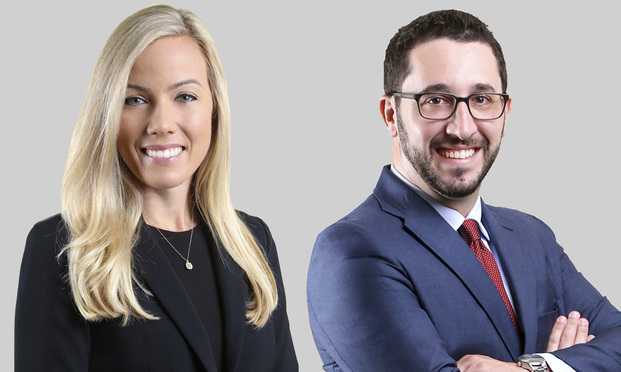Justices Obliterate Rigid Application of a Willfulness Precondition for an Award of Profits in Trademark Cases
By command of the U.S. Supreme Court, regardless of U.S. jurisdiction, infringers may now be required to turn over their ill-gotten gains to a brand owner even where it cannot be proven that the defendant knew or intended to infringe.
May 20, 2020 at 10:55 AM
6 minute read
 Patricia M. Flanagan, left, and Alex L. Braunstein, right, with Fox Rothschild in West Palm Beach.
Patricia M. Flanagan, left, and Alex L. Braunstein, right, with Fox Rothschild in West Palm Beach.
By command of the U.S. Supreme Court, regardless of U.S. jurisdiction, infringers may now be required to turn over their ill-gotten gains to a brand owner even where it cannot be proven that the defendant knew or intended to infringe. This pronouncement came in a decision issued on April 23 in Romag Fasteners v. Fossil, No. 18-1233, ushering a big win for Romag and for brand owners across the country.
Prior to the Romag decision, brand owners who brought a federal trademark infringement or false designation of origin suit within the U.S. Courts of Appeals for the First, Second, Sixth, Eighth, Ninth, Tenth and D.C. faced the rigid application of the willfulness precondition to an award of an infringer's ill-gotten profits. Proof of willful infringement in many cases can be nearly impossible to prove, leaving the brand-owners, in some cases, inadequate remedies for infringement, even if the facts otherwise warranted a profits award. Going forward, all trial courts will have flexibility to award profits where appropriate based on the equities of an individual case.
The 'Romag' Facts
Romag, a family business based in Connecticut, sells patented magnetic snap fasteners under its registered trademark ROMAG® for use in leather goods. Fossil designs, markets, and distributes leather goods, including handbags, which it manufactured outside the United States, including in China. Fossil contracted with Romag to purchase fasteners. Despite red flags as to unauthentic and counterfeit components breaching Fossil's supply chain, Fossil failed to guard against the known risk of counterfeit fasteners. As a result, counterfeit Romag fasteners were distributed in U.S. commerce on Fossil handbags.
Upon learning that Fossil handbags being sold contained counterfeit snaps with the Romag mark, Romag filed suit. Romag alleged that the defendants infringed Romag's trademarks and patents, and sought injunctive relief and monetary damages.
After a seven-day trial, a jury found, among other findings, that Romag proved Fossil infringed its registered trademark in violation of Section 1114, and falsely represented that its products came from the same source as Romag's fasteners in violation of Section 1125(a). Although the evidence showed that Fossil recognized the risk of counterfeit components in its supply chain and Fossil acted with "callous disregard" for Romag's trademark rights, the jury failed to conclude it was "willful infringement." As a result, the district court held that Romag was not entitled to any award of Fossil's profits, because the plaintiff failed to establish the precondition of willfulness, and struck the jury's profits awards to Romag was in excess of $6.8 million.
On appeal to the Federal Circuit, the court was bound to follow Second Circuit precedent from 1992, and, thus, affirmed the trial court's decision.
High Court's Interpretation of Section 1117(a)
The long-time circuit split addressed in Romag arose from differing interpretations of Section 1117(a). However, the plain text of that section does not require a showing of willfulness as a prerequisite to award an infringers' profits. Specifically, Section 1117(a) does not mention the word "willful" in regard to a violation of registered or unregistered marks or false designation of origin, but rather only mentions "willful" in relation to a claim for dilution. That section then provides with respect to such violations that "the plaintiff shall be entitled … subject to the principles of equity, to recover defendant's profits, any damages sustained by the plaintiff and the costs of the action." Nothing in the text of that sentence calls out any additional requirements for profits versus the other listed remedies.
Like Section 1117(a), the Lanham Act repeatedly uses this phrase "principles of equity" or "equitable principles," including, for example, to limit the award of injunctive relief in Section 1116(a). Nowhere are the "principles of equity" defined and, despite their reference throughout the Lanham Act, they have never been interpreted elsewhere to implicitly require a willfulness precondition.
Despite the plain text of the statute and the multiple uses of "principles of equity" referenced in other sections in the Lanham Act discussed above, a number of courts across the country had interpreted the phrase "principles of equity" within Section 1117(a) to incorporate a common-law rule that a trademark owner must prove willful infringement but only with respect to the recovery of a single listed remedy: the defendant's profits.
The high court rejected this interpretation that applied such an "inflexible precondition." The court held that the phrase "principles of equity" in Section 1117(a) only confirms that courts have flexibility to tailor an award of monetary relief—including profits—based on the facts of each particular case. The holding is consistent with the highest court's continuous rejection of rigid, bright-line rules for equitable remedies in intellectual-property cases.
Justices Samuel Alito, with whom Justices Stephen Breyer and Elena Kagan joined, issued a short concurrence noting that willfulness may still be a highly important consideration. Justice Sonia Sotomayor concurred in judgment only, stating in her view, that awarding profits for "'innocent or good faith infringement' would not be consonant with the 'principles of equity.'"
Romag will now be able to go back to district court and argue for its entitlement to an award of Fossil's profits derived from handbags that included the counterfeit Romag components.
Key Takeaways
The Romag decision reduces the disparity of remedies available across jurisdictions and clarifies the proper inquiry for determining a profits award in trademark cases. With the rejection of the rigid willfulness requirement, the power has shifted to the fact-finder to look at the circumstances of the case and, despite an infringer's varying degree of culpability, award profits as appropriate based on consideration of all the circumstances at hand. Previous tests applied must now be re-examined to make sure they comply with the Romag precedent. This decision also highlights the importance of a company to monitor its supply chain and take steps and apply controls to ensure that only authentic components and products are being sourced for use with branded products.
Patricia M. Flanagan and Alex L. Braunstein are attorneys in the intellectual property litigation Practice Group at Fox Rothschild. Based in the firm's West Palm Beach office, they may be reached at [email protected] and [email protected].
This content has been archived. It is available through our partners, LexisNexis® and Bloomberg Law.
To view this content, please continue to their sites.
Not a Lexis Subscriber?
Subscribe Now
Not a Bloomberg Law Subscriber?
Subscribe Now
NOT FOR REPRINT
© 2025 ALM Global, LLC, All Rights Reserved. Request academic re-use from www.copyright.com. All other uses, submit a request to [email protected]. For more information visit Asset & Logo Licensing.
You Might Like
View All

Don’t Forget the Owner’s Manual: A Guide to Proving Liability Through Manufacturers’ Warnings and Instructions
5 minute read

Trending Stories
Who Got The Work
J. Brugh Lower of Gibbons has entered an appearance for industrial equipment supplier Devco Corporation in a pending trademark infringement lawsuit. The suit, accusing the defendant of selling knock-off Graco products, was filed Dec. 18 in New Jersey District Court by Rivkin Radler on behalf of Graco Inc. and Graco Minnesota. The case, assigned to U.S. District Judge Zahid N. Quraishi, is 3:24-cv-11294, Graco Inc. et al v. Devco Corporation.
Who Got The Work
Rebecca Maller-Stein and Kent A. Yalowitz of Arnold & Porter Kaye Scholer have entered their appearances for Hanaco Venture Capital and its executives, Lior Prosor and David Frankel, in a pending securities lawsuit. The action, filed on Dec. 24 in New York Southern District Court by Zell, Aron & Co. on behalf of Goldeneye Advisors, accuses the defendants of negligently and fraudulently managing the plaintiff's $1 million investment. The case, assigned to U.S. District Judge Vernon S. Broderick, is 1:24-cv-09918, Goldeneye Advisors, LLC v. Hanaco Venture Capital, Ltd. et al.
Who Got The Work
Attorneys from A&O Shearman has stepped in as defense counsel for Toronto-Dominion Bank and other defendants in a pending securities class action. The suit, filed Dec. 11 in New York Southern District Court by Bleichmar Fonti & Auld, accuses the defendants of concealing the bank's 'pervasive' deficiencies in regards to its compliance with the Bank Secrecy Act and the quality of its anti-money laundering controls. The case, assigned to U.S. District Judge Arun Subramanian, is 1:24-cv-09445, Gonzalez v. The Toronto-Dominion Bank et al.
Who Got The Work
Crown Castle International, a Pennsylvania company providing shared communications infrastructure, has turned to Luke D. Wolf of Gordon Rees Scully Mansukhani to fend off a pending breach-of-contract lawsuit. The court action, filed Nov. 25 in Michigan Eastern District Court by Hooper Hathaway PC on behalf of The Town Residences LLC, accuses Crown Castle of failing to transfer approximately $30,000 in utility payments from T-Mobile in breach of a roof-top lease and assignment agreement. The case, assigned to U.S. District Judge Susan K. Declercq, is 2:24-cv-13131, The Town Residences LLC v. T-Mobile US, Inc. et al.
Who Got The Work
Wilfred P. Coronato and Daniel M. Schwartz of McCarter & English have stepped in as defense counsel to Electrolux Home Products Inc. in a pending product liability lawsuit. The court action, filed Nov. 26 in New York Eastern District Court by Poulos Lopiccolo PC and Nagel Rice LLP on behalf of David Stern, alleges that the defendant's refrigerators’ drawers and shelving repeatedly break and fall apart within months after purchase. The case, assigned to U.S. District Judge Joan M. Azrack, is 2:24-cv-08204, Stern v. Electrolux Home Products, Inc.
Featured Firms
Law Offices of Gary Martin Hays & Associates, P.C.
(470) 294-1674
Law Offices of Mark E. Salomone
(857) 444-6468
Smith & Hassler
(713) 739-1250






